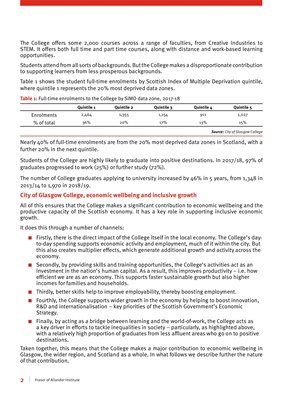
2 Fraser of Allander Institute
The College offers some 2,000 courses across a range of faculties, from Creative Industries to
STEM. It offers both full time and part time courses, along with distance and work-based learning
opportunities.
Students attend from all sorts of backgrounds. But the College makes a disproportionate contribution
to supporting learners from less prosperous backgrounds.
Table 1 shows the student full-time enrolments by Scottish Index of Multiple Deprivation quintile,
where quintile 1 represents the 20% most deprived data zones.
Table 1: Full-time enrolments to the College by SIMD data zone, 2017-18
Quintile 1 Quintile 2 Quintile 3 Quintile 4 Quintile 5
Enrolments 2,464 1,355 1,154 911 1,027
% of total 36% 20% 17% 13% 15%
Source: City of Glasgow College
Nearly 40% of full-time enrolments are from the 20% most deprived data zones in Scotland, with a
further 20% in the next quintile.
Students of the College are highly likely to graduate into positive destinations. In 2017/18, 97% of
graduates progressed to work (25%) or further study (72%).
The number of College graduates applying to university increased by 46% in 5 years, from 1,348 in
2013/14 to 1,970 in 2018/19.
City of Glasgow College, economic wellbeing and inclusive growth
All of this ensures that the College makes a significant contribution to economic wellbeing and the
productive capacity of the Scottish economy. It has a key role in supporting inclusive economic
growth.
It does this through a number of channels:
■ Firstly, there is the direct impact of the College itself in the local economy. The College's dayto-day
spending supports economic activity and employment, much of it within the city. But
this also creates multiplier effects, which generate additional growth and activity across the
economy.
■ Secondly, by providing skills and training opportunities, the College's activities act as an
investment in the nation's human capital. As a result, this improves productivity - i.e. how
efficient we are as an economy. This supports faster sustainable growth but also higher
incomes for families and households.
■ Thirdly, better skills help to improve employability, thereby boosting employment.
■ Fourthly, the College supports wider growth in the economy by helping to boost innovation,
R&D and internationalisation - key priorities of the Scottish Government's Economic
Strategy.
■ Finally, by acting as a bridge between learning and the world-of-work, the College acts as
a key driver in efforts to tackle inequalities in society - particularly, as highlighted above,
with a relatively high proportion of graduates from less affluent areas who go on to positive
destinations.
Taken together, this means that the College makes a major contribution to economic wellbeing in
Glasgow, the wider region, and Scotland as a whole. In what follows we describe further the nature
of that contribution.